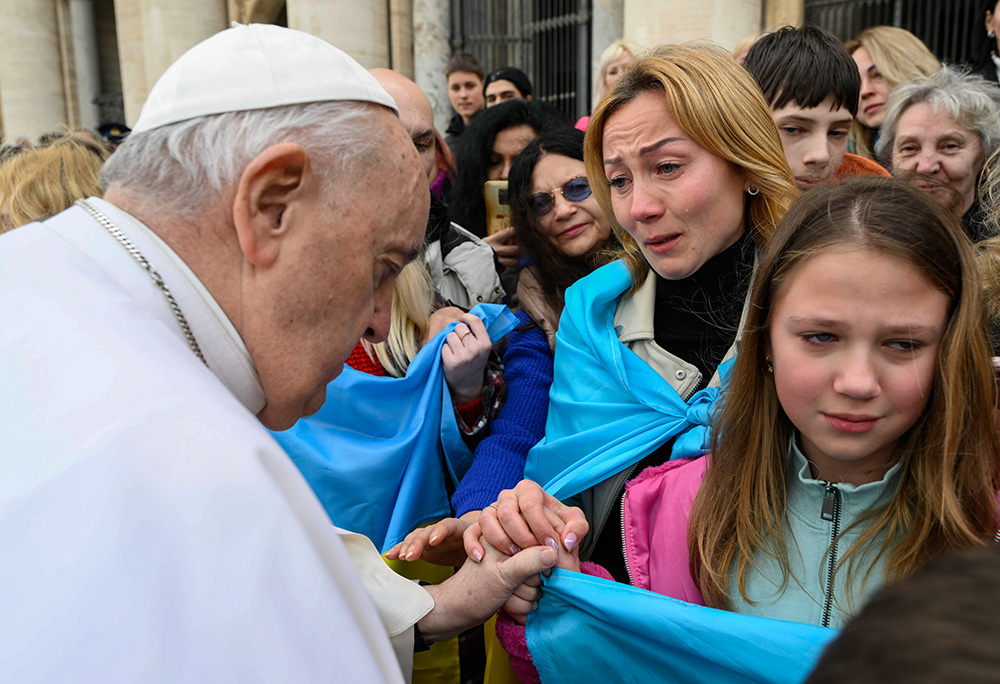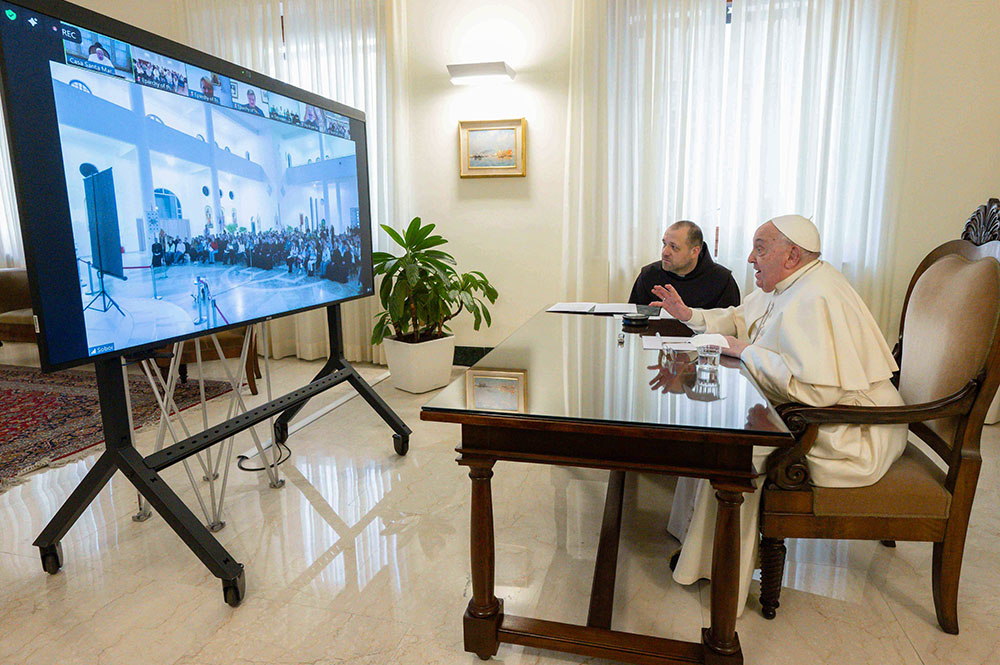
Pope Francis greets Ukrainian refugees after his weekly general audience in St. Peter's Square at the Vatican March 8, 2023. (CNS/Vatican Media)
Sometimes, death becomes a spotlight that illuminates human life. This thought came to me on the day of Pope Francis' departure to eternity as I read testimonies written in his honor by my Ukrainian compatriots and my Croatian and Italian friends.
The attitude of Ukrainians toward Francis has been complex over the past three years. The pope emphasized the need for peace in suffering Ukraine in nearly every audience and public speech. However, Ukrainians sometimes felt disappointed, hoping the pope would explicitly condemn their aggressor.
I personally received many questions from my Ukrainian friends and relatives doubting the pope's stance toward Ukrainian suffering. That is why I was particularly struck on April 21 when I read words of gratitude from many Ukrainians to Francis for his concern regarding the release of Ukrainian prisoners, the return of deported Ukrainian children, and his humanitarian initiative, "The Pope for Ukraine."
Private testimonies have also surfaced, confirming other personal initiatives by the pope in support of Ukrainians and his sympathy for Ukraine, which he expressed in personal conversations with representatives of the church and Ukrainian society.
A particularly meaningful testimony for me was from a Protestant friend who had previously expressed disappointment with the pope's stance on Ukraine. Yet, my friend devoted his Easter Monday to writing an article in honor of Francis, recognizing his contribution to the history of the Catholic Church and modern society.
In my opinion, this confirms that Ukrainians, most of whom are not Catholics, saw Francis as a moral authority. On the day of Francis' death, the primate of the Orthodox Church of Ukraine, Epiphanius, led a prayer for the repose of the pontiff in St. Michael's Cathedral in Kyiv.
Advertisement
In the modern world, every leader, whether ecclesiastical or political, is illuminated by the media and social networks. Being in the public eye and receiving opposing assessments of one's activities makes it extremely difficult to remain true to oneself, resist pressure from various groups, and uphold one's ideals.
I believe this was challenging for Francis. From the very beginning, his gestures of simplicity and openness — as well as changes in his style of behavior and clothing — both inspired admiration and provoked condemnation.
In 2013, while studying at the faculty of theology, I remember the admiration for the new pope among my professors, who viewed him as the embodiment of the values of the Second Vatican Council and a church open to the world. Conversely, I also recall the reaction of some acquaintances who were scandalized by his behavior. Supporters of conspiracy theories and radical conservatives searched for anti-Catholic and even anti-Christian evidence in his gestures and words.
This is why it is admirable that Francis maintained his approach throughout his pontificate — from his first words as pope, "Brothers and sisters, good evening," to the final blessing of the faithful with a trembling hand on Easter 2025.
The end of Francis' pontificate prompts my personal reflection. First, it raises the question of what the figure of the Roman pontiff means in today's world.

Pope Francis waves to young people gathered in the Ukrainian Greek Catholic Cathedral of the Resurrection in Kyiv, Ukraine, during an online meeting Feb. 1, 2025. (CNS/Vatican Media)
The testimonies of my Ukrainian compatriots convince me that contemporary individuals, irrespective of their religious affiliation, see the pope as a moral authority and a defender of the most oppressed and marginalized. They expect him to represent the voice of the voiceless — those unheard and invisible in our world today. The secularized world needs spiritual leaders who do not succumb to political or media pressure and uphold God's law regarding the value and dignity of every human life.
Despite secularization, religious and theological education is crucial. In today's world, religion carries significant weight, often becoming a tool for political manipulation. On the eve of elections, politicians tend to emphasize their piety or support for Christian values only to win votes.
As you browse social media these days, you will likely find, alongside words of condolence honoring the pope, various conspiracy theories and gossip. And we can be sure that the election of the next pope will also be accompanied by media hype, various rumors and perhaps even attempts to provoke scandals or divisions.
One of our tasks today as women religious is to help the people we work with and resist manipulation on religious grounds. In this light, consecrated persons themselves should adopt a critical approach to the information that reaches them. Many people see us as an authority, and we bear responsibility for the values we convey.
Pope Francis was a human being who made mistakes, but he tirelessly sought God and tried to remain close to the people entrusted to him.
I cannot overlook Francis' contribution to defending women's rights, particularly those of women within the church. Many people today quote his addresses in which he defended women religious against the abuses of superiors or religious leaders. In this regard, he took the first steps that his successors must continue.
Unfortunately, consecrated women today remain marginalized in the church. Struggling with challenges such as aging membership, the closure of ministries, and need for deep structural changes, they often become the object of societal criticism. We welcomed Francis' appointment of some women to key positions within the church, but like me, you may have also heard mocking comments from male clergy regarding these appointments.
Francis was a human being who made mistakes, but he tirelessly sought God and tried to remain close to the people entrusted to him. It is symbolic that he passed away during the Year of Hope, which he himself proclaimed. His departure is a gesture pointing to something greater than human possibility. Only God can respond to our aspirations and grant true hope. Yet, it is through our openness that God touches our brothers and sisters.
To give hope means showing someone they are not abandoned — that they are seen and heard in both their joy and suffering. Through his addresses, visits and actions, Francis illuminated many marginalized groups in society, giving them hope that their voices would be heard. Today, in the spotlight of eternity, we praise the Lord for the gift of life of Francis and pray that his legacy will be continued and developed.
May the Lord grant Pope Francis eternal rest.








